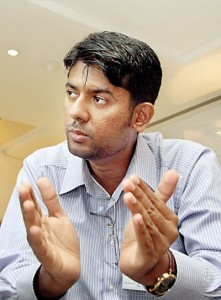All set for trail blazing venture in drug industry
By early 2015, Dinara S. Gunasekera will be going to work at one of the best appointed laboratories to be found anywhere in the country. It will have cost many, many millions to equip, and between sustaining the in-house chemical library and buying the liquid helium that will be needed to maintain certain equipment the total bill will only be added to over time. However, while the synthetic and medicinal chemistry lab at the Sri Lanka Institute of Nano Technology (SLINTEC) won’t come cheap it also has the potential to kick start an entire new local industry, driving growth and innovation for decades to come.
The lab is expected to become operational in January. Having worked in the US for the last decade, Dinara has been recruited as a senior research scientist by SLINTEC and comes from a background in organic chemistry, with a special interest in pharmaceuticals. He’ll be applying that knowledge to helping Sri Lanka develop its own Active Pharmaceutical Ingredients or API. API are the active ingredients in a drug that make it effective in treating a particular disease.
Currently, Sri Lankan companies import API in most part from suppliers in India and China. This hasn’t been without its problems – without high end equipment, quality control in particular is challenging since it can be difficult to verify the source as well as test the APIs that are imported. Expensive packaging is no indicator – with even western drug companies often relying on imported API. In addition, poor transport conditions can sometimes lead to degraded ingredients.
“What happens is that when the API is poor quality, when you formulate the drug and package it, no matter what, it stays poor quality,” says Dinara adding that this can lead to doctors writing off a drug that might have been able to help a patient. He envisions a time when Sri Lanka won’t be reliant on APIs from abroad. “We are trying now to synthesise our own drugs,” he says. To do this, they need the equipment, the chemicals and of course the trained staff. The will have to start small, perhaps by developing four or five APIs and then finding local companies who can serve as partners to scale up the production and start exporting them.
This process could have the dual benefit of making quality drugs more affordable locally even as they become a source of valuable revenue for Sri Lankan companies. At the SLINTEC lab, they will be starting small, and plan to invite companies to compare the new APIs with what is already being imported. It only works if the newer models are better.
Among the pieces of equipment needed to run the lab will be a nuclear magnetic resonance spectroscopy (NMR) instrument which,while not the first one in Sri Lanka, will still prove a valuable tool for the local scientific community. Other crucial equipment will include liquid chromatography–mass spectrometry (LC-MS) and gas chromatography–mass spectrometry (GC-MS) instruments. The in-house chemical laboratory will be the first of its kind in Sri Lanka and will be stocked with an estimated 200 – 300 compounds that are sure to prove vital to the process of creating API.
Once the first few are done, Dinara hopes the lab will hit its stride and be able to produce more in quick succession. He anticipates that first 15 APIs will take two or three years to create.
Dinara, who initially worked as a Research Chemist at the National Buildings Research Organization (NBRO) switched to studying organic chemistry in the US when he saw how much manpower and funds were being poured into pharmaceutical research. While earning his M.S in organic chemistry from the University of Minnesota, he designed a new and more effective way to synthesise benzoboroxole compounds to treat onychomycosis, a fungal infection that affects the foot. Their compound was approved by the FDA subsequently.
For his PhD from Purdue University, he went to work on developing a more efficient way to produce the anti-flu drug Tamiflu, even as it upped the drug’s potency. During this period, he also worked on drug delivery systems that could be used to combat cancer. Having completed his studies, he would later work as a chemical consultant at Constellation Data Systems, in Cincinnati, USA.
In Sri Lanka, Dinara maintains a hectic schedule. Serving as a senior lecturer at the College of Chemical Sciences in the Institute of Chemistry, in addition to his responsibilities with SLINTEC, he typically works a seven day week. It’s made worth it though by the opportunity to be part of such an exciting project. The challenges will be many, but if the team at SLINTEC can rise to meet them, they will have under their belts an achievement something few others can claim – the seeds from which sprouted a new Sri Lankan industry.


